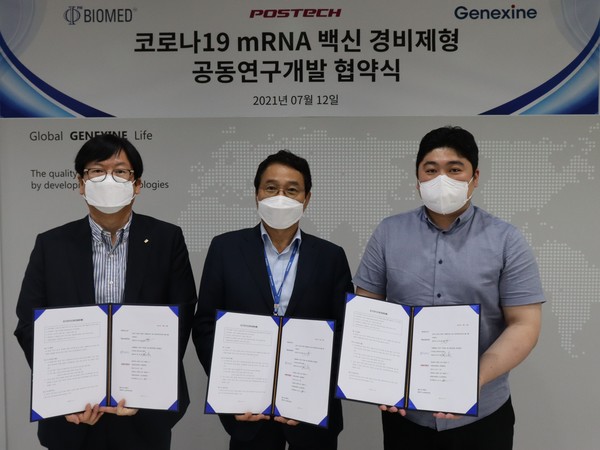Genexine will conduct joint research with Phi Biomed and Pohang University of Science and Technology (POSTEC) to develop the next-generation mRNA vaccine that overcomes the limitations of existing mRNA vaccines.

The three partners signed an agreement at Genexine headquarters in Seongnam, Gyeonggi Province, on Monday. According to the accord, they will develop a Covid-19 mRNA vaccine with an optimal design and development of a next-generation delivery system that can solve stability and safety in the body, pointed out as the problems of previously developed mRNA vaccines.
"We will jointly own the results, such as technology and intellectual property rights, generated through the joint research," Genexine said.
In developing the new mRNA vaccine, Professor Oh Seung-soo's team at POSTEC plans to conduct research to maximize the vaccine's prevention efficiency through the designing and detailed engineering of mRNA used in the Covid-19 vaccines.
Phi Biomed, a bio diagnosis and treatment system developer, plans to develop a new LNP (lipid nanoparticles) platform technology for mRNA vaccine delivery that can overcome the limitations of existing LNPs.
Genexine will lead cooperation with the two partners based on its experience and know-how in developing a Covid-19 DNA vaccine.
"The next-generation mRNA vaccine that we plan to develop through this joint project will be a vaccine that can effectively deliver the mRNA vaccine to the body using a hyaluronic acid-lipid transporter," the company said. "Also, considering the convenience of administration, we plan to develop the vaccine suitable for both an injection and nasal administration."
When administering the vaccine through the patient's nose, the company will co-administer GX-I7, one of its core pipelines that will maximize the mucosal site's immune response and prevent viral infection. In addition, as hyaluronic acid naturally exists in the body and is a high-molecular material with excellent biocompatibility, it effectively improves the stability and safety of LNP formulations, according to Genexine.
Therefore, it becomes possible to develop a formulation available for storage at various temperatures while improving safety by reducing the occurrence of side effects such as anaphylaxis and hepatotoxicity, which are disadvantages of conventional PEG (polyethylene glycol) containing mRNA vaccines.
"Both DNA vaccines and mRNA vaccines are nucleic acid-based vaccines that do not directly deal with infectious agents, so they have excellent safety and can be developed at low costs,” Genexine CEO Sung Young-chul said.
He went on to say, “We already have DNA gene vaccine technology with high safety and strong and extensive T-cell immune response. However, rather than sticking to just one platform, the company will do its best to secure various vaccine technologies to prepare for future infectious diseases.”

